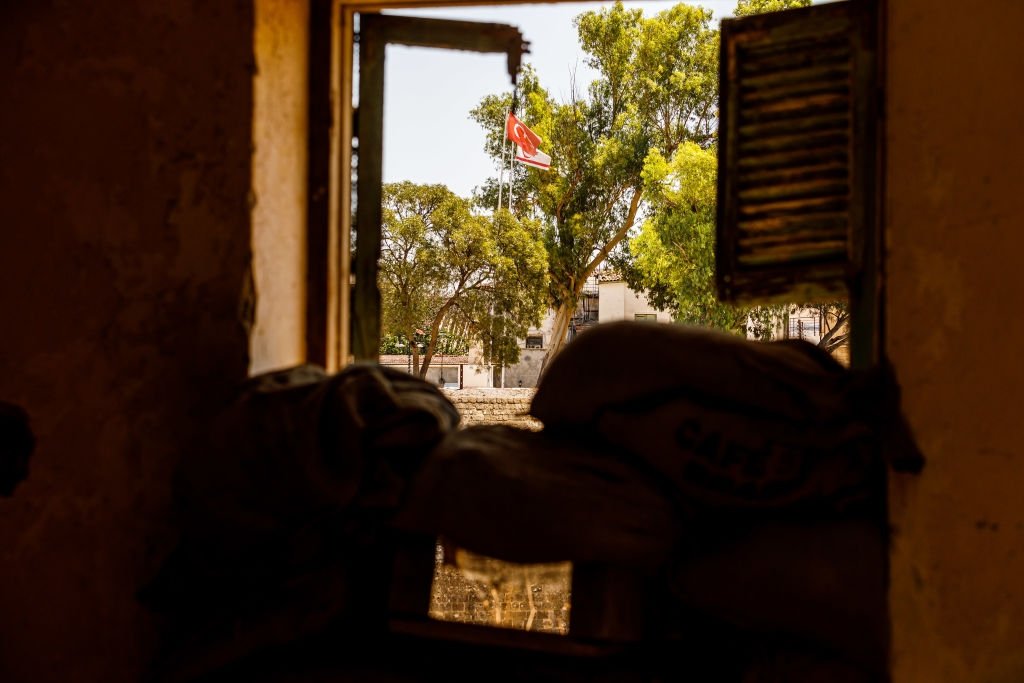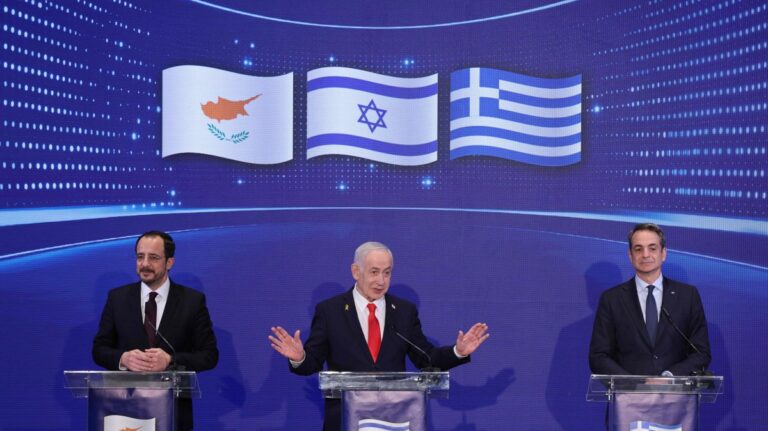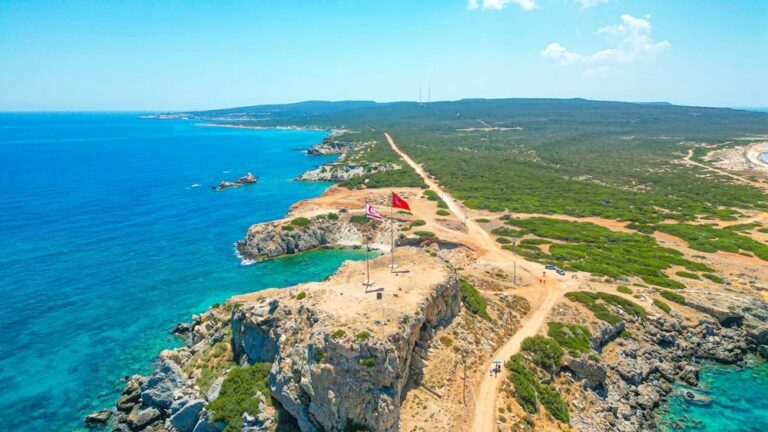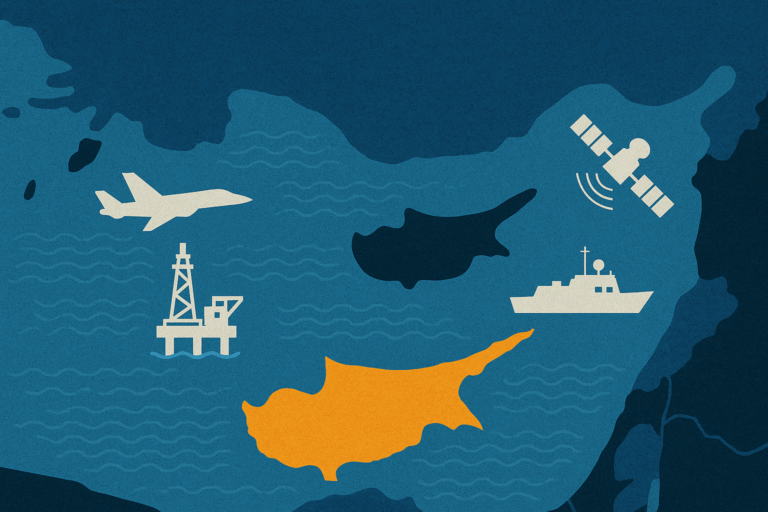Welcome to the Turkish Republic of Northern Cyprus (TRNC), where the sun is hot, the beaches are gorgeous and your phone call is probably being intercepted.
Yes, while tourists sip frappés and a few left-wing diplomats issue recycled soundbites about reunification, Turkish Cyprus, and in fact the entire island, has quietly become one of the most hyper-surveilled, geopolitically contested slices of land in the Eastern Mediterranean. There are no tanks rolling down the Kyrenia coast. No warplanes streaking over the Mesaoria plain. Just satellites, signals, shadow bases, and a spy game so thick you could cut it with a fiber optic cable.
Empire never left, it just got Wi-Fi
Cyprus has always been the island that “other people” use. The British garrisoned it. NATO postured with it. The EU lectures about it. But now, in the glorious chaos of the 21st century, it’s become something much more fashionable: a full-service, cloud-integrated, soft-power-infused espionage theme park.
And the TRNC? It’s the main attraction, not for what it has, but for what it doesn’t: recognition, oversight, and frankly, anyone watching the watchers.
Take Britain’s Akrotiri and Dhekelia bases. These aren’t colonial relics, they’re Crown-branded listening hubs beaming metadata into the hearts of the U.K.’s Government Communications Headquarters (GCHQ), Langley, and yes, even Herzliya. U.S. National Security Agency (NSA) intelligence contractor Edward Snowden’s leaks made one thing clear: Cyprus is the ear pressed to the wall of the Middle East. Roughly a third of regional signals intelligence passes through the skies above the TRNC. Who knew your beachfront property could double as a node in Western electronic warfare?
Let’s not pretend Britain is eavesdropping solo. Akrotiri and Dhekelia may fly the Union Jack, but the antenna arrays hum with American hardware. GCHQ and the NSA are in a data-sharing marriage known as Five Eyes, and Cyprus is one of their Mediterranean love nests. The terabytes flowing through these bases aren’t just archived in Cheltenham, they’re mirrored in Fort Meade.
Together, the U.K. and U.S. run what amounts to a Mediterranean panopticon: from Turkish airspace to Levantine telecoms, from Libyan naval chatter to Iranian logistics in Syria. And yes, the TRNC’s own digital pulse, unprotected and unencrypted, gets swept up in the current.
No permission asked. No partnership offered. Just an Anglo-American duet of mass interception, choreographed for strategic harmony.
But let’s not forget: the Israelis are also here, just not officially. Or visibly. Or legally.
Israel outmaneuvers Iran
Israel-linked companies have been quietly snapping up coastal properties along the TRNC’s north and east, often through shell firms with ex-military fingerprints. These are not your average sun-seeking investors. They don’t build. They don’t renovate. They position.
The pattern? Rural, strategic elevation, proximity to undersea cable landing zones. You call it “investment.” They call it “line of sight.”
In 2023, Mossad disrupted a Quds Force operation based in – you guessed it – the TRNC. Iranian operatives were allegedly using Northern Cypriot territory to plan attacks on Israeli nationals abroad. It’s the kind of international terrorism you’d expect to be sniffed out by local counterintelligence. Too bad the TRNC doesn’t have one.
Of course, Mossad isn’t playing favorites. Larnaca and Paphos airports have become southern chapters of Israel’s “perimeter defense” doctrine. Under the guise of cooperation, Israeli agents reportedly scan devices, profile travelers, and intercept in real time. The terminal is less “international gateway” and more “regional annex of Shin Bet.”
Now, both sides of the Green Line are operational zones. If you’re not spying, you’re being spied on. Or hosting someone who is.
European actors onstage
Meanwhile, Greece and Greek Cypriot authorities, with great support from the European Commission, are deploying soft power with surgical precision. Bi-communal programs, youth exchanges, scholarships – all dressed up as peace-building. But students return with curious stories: strange questions about public institutions, digital systems, police routines. “Reconciliation” begins to sound a lot like reconnaissance.
Media, too, isn’t spared. Funded content flows northward, subtly nudging public sentiment. The message? You’re too corrupt, too isolated, too small, maybe reunification is your only hope. It’s not journalism. It’s narrative warfare.
If Europe had a two-act spy play in Cyprus, France would be the dramatic lead and Germany the meticulous stage manager.
France, ever the Mediterranean romantic with delusions of Napoleonic grandeur, has thrown its weight behind Southern Cyprus and Greece. Naval assets dock in Limassol. Rafale fighter jets conduct theatrical fly-byes over contested waters. Signals intelligence reportedly flows between French, Israeli and American channels like fine Bordeaux at a Brussels summit.
Macron isn’t just here for diplomacy. He’s here for influence, relevance, and perhaps a little revenge against Anglo-American dominance. It’s soft power with a sabre under the table.
Germany, on the other hand, never kicks in the door. It just files the right paperwork. Berlin’s influence seeps in through EU grants, cross-border “peace programs,” and capacity-building workshops on everything from democratic governance to digital literacy. And yes, somewhere between the Excel sheets and PowerPoint slides, data is collected, loyalties are mapped, and narratives are gently… nudged.
The Bundesnachrichtendienst (BND) doesn’t need spies in trench coats. It has graduate fellows, NGO auditors and a permanent seat at the policy table.
Together, France and Germany represent the continental two-step: one projecting hard power to stabilize the stage, the other scripting the play. Cyprus, as usual, is caught between the lines of dialogue – watching the EU’s strategic theater unfold on its soil, often without being allowed a speaking role.
Russia perfectly positioned
And then there’s Russia. Quiet, polite, well-dressed. Officially, Moscow is merely offering consular services to some 120,000 Russian citizens in Southern Cyprus. Unofficially? It has stationed what is effectively a diplomatic garrison: over 300 personnel tied to the Russian embassy, on a divided island the population size of a medium-sized European city.
The ambassador? A former Federal Security Service (FSB) general, naturally. Because nothing says “diplomatic courtesy” like surveillance fiber, encrypted comms hubs, and intelligence staff in beachwear. But this isn’t just presence. Its placement.
Cyprus, for Russia, is a Mediterranean backdoor into Europe. Close to NATO’s southern flank, within signal range of Syria and Türkiye, and just bureaucratically murky enough to be very useful. For decades, South Cyprus was a favored Russian laundromat, washing oligarch wealth through banks, real estate, and shell firms with a sun-kissed flourish.
Even after the war in Ukraine and a wave of sanctions, Russian oligarchs didn’t vanish from the island. They went quiet. Their yachts stopped docking under Russian flags. Their holdings now pass through second-tier trusts, Cypriot intermediaries, and investment vehicles registered in jurisdictions one has never heard of.
When Western embassies pressured Cyprus to clean up, Moscow shifted gears, not away from Cyprus, but deeper into its shadows.
The TRNC, unrecognized and unregulated, offers a new playground. No international financial oversight. No EU anti-money laundering directives. No questions asked. Just a ready-made gray zone ideal for hiding assets, collecting data, and slowly weaving threads into the regional power web.
Russia isn’t here to start a war. It’s here to watch one and leave quietly before the smoke clears. Cyprus isn’t just on the soft-containment chessboard, it’s being carved into a launchpad.
China patiently eyes Cyprus
If Russia is the quiet player at the table, China is the one still reviewing the floor plan. No bases. No drama. Just a silent presence, methodical positioning, and an eye on the long game.
So far, China’s footprint in Southern Cyprus has been conventional: trade missions, university partnerships, and growing interest in ports and energy logistics. But China’s real power lies not in what it builds, but in where it waits.
Cyprus straddles the EU, the Middle East, and contested maritime zones. Beijing has already applied this model in Djibouti, the Balkans, Pakistan, and parts of Africa: start with telecom bids, educational programs, and friendly diplomacy – then scale into infrastructure, digital governance, narrative influence and external debt.
And the TRNC? For China, it’s not an inconvenience – it’s a sandbox. A place where rules are vague, oversight is minimal, and influence can be quietly coded in.
Expect China’s presence to remain low-key but perfectly engineered. A Confucius Institute here. A green port proposal there. A few smart city partnerships quietly bundled with next-gen surveillance firmware.
In the long game of influence, China doesn’t shout. It calibrates – until the island turns around and realizes it’s already wired.
TRNC tragically transparent
While great powers play four-dimensional chess on Cyprus and even TRNC soil, the TRNC is playing… sudoku. Maybe. With no domestic intelligence service, no cyber command, no counterintelligence infrastructure, and no strategic coordination with Ankara, the TRNC is a sovereign body without a nervous system.
As local newspapers put it: “Northern Cyprus is where others do strategy.” And they’re right. Survival requires strategy.
The TRNC doesn’t need polite requests for recognition; it needs a full-spectrum intelligence transformation. A regional coordination center with Türkiye’s MIT, cyber defense, soft power counter-measures, human intelligence vetting, and infrastructure surveillance.
Sovereignty isn’t a slogan. It’s infrastructure. And right now, Northern Cyprus is an open sandbox for anyone with a satellite, a shell company, or a cultural festival grant – leaving it vulnerable to interference that compromises both its institutional security and its commitment to a two-state solution, all of which remains precariously dependent on the shifting tides of global and regional geopolitics.
History turns on seemingly irrelevant outposts. Northern Cyprus is no longer an afterthought; it’s a strategic keystone. It will either remain a stage for other nations’ ambitions or become something much rarer in modern geopolitics: a small power with agency.
In an age where wars are also waged without bullets, the TRNC must learn to see the battlefield it’s already on. Because in the intelligence world, if you’re not the hunter, you’re the habitat.




